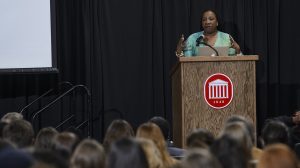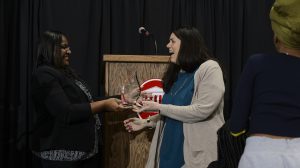
#MeToo founder Tarana Burke captivates her listeners during the Women’s Empowerment keynote address at the University of Mississippi. Photo by Marlee Crawford/Ole Miss Communications
OXFORD, Miss. – Discussing the origin of and vision for the #MeToo movement, founder and social activist Tarana Burke challenged listeners Tuesday (March 20) at the University of Mississippi to transform their own communities so survivors of sexual violence can be seen, heard and heal.
Burke addressed about 400 attendees during her Women’s History Month keynote address in Fulton Chapel. The crowd listened intently as she shared her journey from being a victim as a teenager to becoming a crusader at age 22.
“The MeToo movement is committed to making it safe for people to speak their truth,” Burke said. “We’re not there yet. We haven’t had a cultural shift. You deserve safety and you deserve protection wherever you live.”
Burke has dedicated more than 25 years of her life to social justice and to laying the groundwork for a movement that was created initially to help young women of color who survived sexual abuse and assault. The movement inspires solidarity, amplifies the voices of thousands of victims of sexual abuse and puts the focus back on survivors.
“The reality of sexual violence is harsh and sad, but people tend to hold on to it because it’s familiar,” she said. “We’re about reversing that by teaching people to fight against their trauma and lean into the joy that comes with healing.”
Working under the banner of the #MeToo Movement, Burke assists other survivors and those who work to end sexual violence. She is also senior director of programs at Brooklyn-based Girls for Gender Equity.
Because sexual violence is so pervasive, Burke called for members of the audience to themselves become activists who unleash their collective power to transform their environments into places safe for all. She mentioned efforts to create a global virtual community and to organize healing circles in communities worldwide.
“We need more people to get involved and address the real underlying issues behind sexual violence,” Burke said. “I couldn’t ignore it, and neither should you. We have work to do. It’s time to work.”
Burke’s comments resonated with UM administrators and staff.
“I left thinking about the numbers, especially all those that actually stated/tweeted “me too” and those that are still silent,” said Brandi Hephner LaBanc, UM’s first female vice chancellor for student affairs. “I do believe we do a good job of serving survivors, but I always believe there is room for improvement.
“Also, we need to be more intentionally focused on the spectrum of sexual violence and make our campus as supportive as possible.”
Shawnboda Mead, director of the university’s Center for Inclusion and Cross Cultural Engagement, said she hopes that Burke’s emphasizing #MeToo is not a women’s movement, but a survivor’s movement, helped everyone in the audience identify ways they can contribute to it.
“As Ms. Burke mentioned, giving words and space to survivors and making sure all of our students feel safe must be an institutional priority,” she said. “The CICCE is looking forward to working with RASA, the Office of Violence Prevention, and other campus and community organizations to keep the conversations going.”

Lindsey Bartlett Mosvick (right), assistant director for violence prevention at the University Counseling Center, receives the Women’s Inspirational Award from Shawnboda Mead, director of the Center for Inclusion and Cross Cultural Engagement. Photo by Marlee Crawford/Ole Miss Communications
Before Burke’s presentation, the Women’s Inspirational Award was presented to Lindsey Bartlett Mosvick, assistant director for violence prevention at the University Counseling Center and staff adviser for Rebels Against Sexual Assault. The award recognizes a woman who motivates, empowers and inspires other women on campus to be better leaders.
“The award was a total surprise to me,” Bartlett Mosvick said. “It is a tremendous honor to be recognized for my work, as I consider myself fortunate to be able to serve student survivors of violence on our campus.
“The survivors are the ones who inspire me daily and motivate me to work harder to prevent violence in our community.”
Bartlett Mosvick formed the Green Dot strategy, a comprehensive approach to violence prevention at Ole Miss that capitalizes on the power of peer and cultural influence across all socioeconomic levels.
“This honor represents the joint commitment the students on our campus and I have to supporting survivors of violence in coming forward and receiving the services they may need,” she said. “Tarana Burke’s message resonates with the continued collective responsibility we all have to uplift survivors and change our culture.”
Sponsors of the event included the Center for Inclusion and Cross Cultural Engagement, the University Lecture Series, E.S.T.E.E.M., Department of Intercollegiate Athletics-Student Athlete Development, Ole Miss Panhellenic, Ole Miss Student Housing, the Associated Student Body, the National Pan-Hellenic Council, the Sarah Isom Center for Women and Gender Studies, RASA, FEMISS, the African American studies program and the Office of Fraternal Leadership and Learning.